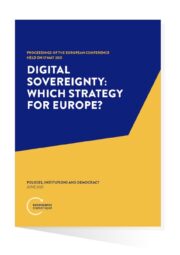Publication 18 June 2021
Digital Sovereignty: Which Strategy for Europe?

Issues related to digital sovereignty have gained an increasing importance in the strategic documents put forward by states, in the reflections of European institutions and, more recently, in the recovery plans envisaged at both the national and European Union (EU) levels. With the awareness resulting from the coronavirus crisis, the issues of dependence of national production chains on non-European companies have taken on an urgent character. The resilience of states in the face of geostrategic risks has become a necessity, calling for the development of a common European digital response. The conflict between China and the United States, particularly in the digital field, crystallises the tensions between two opposing political and economic models. This rivalry is expressed both within international governance bodies, where the two powers clash to maintain control over the definition of international standards, and through frontal trade sanctions. In this context, the member States of the European Union must define their own path.
But what is “digital sovereignty” exactly? What does it mean for Europe to be “digitally sovereign”? Where and at what level is the EU dependent in the digital field? How can it develop sufficient digital capacities in order to guarantee its sovereignty?
To answer these questions, Renaissance Numérique, with the support of the Office of the French Ambassador for Digital Affairs, gathered the public actors, members of civil society, researchers and companies that reflect and act on the issue of digital sovereignty at the European level.
These written proceedings constitute a report of the discussions in the most exhaustive way possible. However, it only commits Renaissance Numérique, not the quoted actors.
-

Publication 13 January 2022
European technological sovereignty
-

Publication 29 March 2021
Digital Markets Act: A revolution or a legal contradiction?


